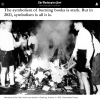hanimmal
Well-Known Member
https://www.washingtonpost.com/politics/2021/11/11/symbolism-burning-books-is-stark-2021-symbolism-is-all-it-is/
Sean Connery said it best.

Reading the comments made by two Virginia school board members apparently endorsing the burning of books they’ve deemed inappropriate, it’s hard to determine the effect.
“I think those books — I don’t want to even see them. I mean, I think they should be thrown in a fire,” one said. His colleague later added that many people in the community would probably like to “see the books before we burn them, just so we can identify within our community that we are eradicating this bad stuff.”
When you watch video from the school board meeting, though, the intent is clear. The first speaker, 24-year-old Rabih Abuismail, is calling for the books to be burned specifically to emphasize his point. He’s strongly opposed to the books — in this case, primarily ones with content centered on gay, lesbian and transgender subjects — and decided to use one of history’s most notorious demonstrations of opposition to undergird his point.
One might justifiably dismiss this incident as an exception, one member of one small school board making one comment about destroying books. The Washington Post’s Aaron Blake, though, points out the broader context. Republican officials (like those in Virginia) have repeatedly called for the removal of books from school and public libraries in recent weeks, or have called for material to be reviewed as a first step to that end.
What’s useful to keep in mind about these efforts is how they contrast with the efforts to which they’ve been compared, the burning of books in Nazi Germany. As the U.S. Holocaust Memorial Museum points out in this video, the impetus for removing books from university libraries in the 1930s was largely to eliminate anti-German rhetoric and thought. Though it eventually became a tool of the state, many initial efforts stemmed from enthusiastic university students who sought a sort of ideological purification of their schools.
But consider a critical difference between that effort and the ones in the moment. The Nazi regime embraced book confiscation and destruction in part because it provided a point of propaganda and a demonstration of loyalty. But it also clearly embraced the practice because collecting or burning the books largely took the ideas out of circulation. There was symbolism and political utility in large crowds surrounding bonfires of forbidden thought. But there was a very practical utility, too. If you burned all copies of a Hemingway novel, it became very hard to read that novel. The book burnings helped demonstrate how some ideas were prohibited in the abstract but they also helped limit the spread of those ideas.
That is not the case today. If you want to read the book “33 Snowfish,” for example — one of those targeted in Virginia — you can buy a copy and have it sent to your house. You can buy an e-book on Amazon and start reading it in about 20 seconds. You might be able to check it out of your local library, including through your library’s digital-access portal for e-books.
It is certainly possible that a dystopic future effort to uproot books like that one might see it vanish from libraries or online sales. But even then, the Internet and digital sharing means that it will be nearly impossible to eradicate. If we shut down the Internet, maybe — but by then, the scale of what’s underway is far worse than banning one book.
Put another way, the banning of books in 2021 is almost entirely about symbolism. They’re about the ability to posture about how some content is bad and toxic and how you are Taking a Stand. What’s particularly amusing is when the condemnations are centered on prurient content, as though a teenager looking for titillation in 2021 has no other recourse than skimming the stacks of the school library with fingers crossed. My friend, have you seen the things that are available on your cellphone these days?
To say you want to ban a book from being available to children in their school library is not to say you are protecting that kid from the book’s contents, because you can’t. (In fact, you’re probably just going to make them more interested in seeking it out, which they can do easily, because this isn’t 1933.) What you’re doing, instead, is saying that you are making a point about how robustly you will fight against thoughts and stories that your supporters dislike. You are saying that, while you might disagree with the Nazis’ rhetoric, you can’t argue with their tactics.
What makes the Virginia situation even more ludicrous is that the books being targeted were identified by a pearl-clutching parent on the school’s digital library app. What are you going to do, buy copies of the book to burn? Burn the kid’s Kindle? (If so, do they need to have that book actively being read or what?) It reinforces the point perfectly: The book itself won’t actually be burned or destroyed, but we’ll make a point about how much we hate it.
Ludicrous, yes, but this doesn’t make it better. There are calls to ban the essentially unbannable, to make it slightly harder to read a book, because of the political utility in doing so. The value to many of these legislators is not in limiting access but in being seen as the type of leader who will try to limit access to material his supporters might not like. That’s what the other board member in Virginia, Kirk Twigg, said: They need to show the community that they’re “eradicating this bad stuff.”
It’s the bonfire that’s the point, not the fuel.
Sean Connery said it best.
















